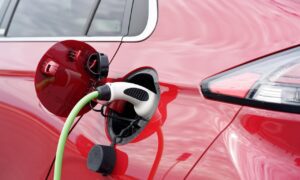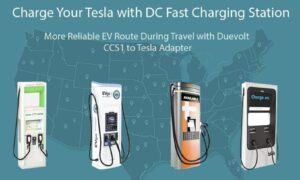The rapid expansion of EV charging facilities has driven increased demand for smart charging technology. As EV numbers grow, traditional charging alone cannot satisfy drivers’ needs or support power grids efficiently. With no communication between vehicles, stations, and utilities, it’s difficult to enhance efficiency and convenience and reduce grid impacts.
Smart EV charging introduces advanced technologies. It does so by considering real-time conditions like load levels, electricity prices, grid stability, etc. This brings benefits not just for users through lower costs but also assists grids in integrating more renewable energy. As EV adoption continues to climb, smart charging will be important for sustainably powering this green transition!
Non-Smart Charging vs. Smart EV Charging
Non-smart or traditional EV charging is simpler—vehicles plug in and charge at a constant rate without coordinating with other factors. This works but lacks optimization.
With non-smart charging, opportunities are missed to utilize low electricity prices or the integration of renewable energies. Utilities also can’t predict charging loads to balance supply and demand. Problems may arise as EV quantity rises.
What is smart charging? It’s a more intelligent form of electric vehicle charging that connects EVs, chargers, charging operators, and power suppliers. It considers real-time grid conditions, electricity costs, drivers’ needs, and other parameters.
Smart charging enables operators to monitor, manage, and adjust energy consumption through specialized apps. Car owners can also use this app to control smart chargers and preset charging times, avoiding peak electricity consumption and prices.
Compared to non-smart alternatives, it provides clearer benefits for users, operators, and the electrical network long-term!
Functions of Smart EV Charging
Advanced charging control functions optimize the charging process for electric vehicles. The functions of smart EV charging include:
- Smart Remote Control
Smart EV charging technology empowers remote monitoring and adjustments through EV charging software. This shifts some control over to users, giving them options to maximize affordability and convenience. The contents include:
1) Remote Access
Smartphone applications give EV owners the power to access key charge information, monitor charging status, and make changes to settings regardless of their location.
For example, after the charging management software is matched with the charging station, you can view the charging current, voltage, power, temperature, and battery level.
This remote monitoring puts management firmly in the hands of drivers, no matter whether during travel or at home.
2) Scheduled Charging
Intelligent EV charging units provide a helpful scheduled function to automate charging times for electric cars. Car owners can set specific start and stop times for charging, such as during periods of lower local electricity prices.
By doing this, savvy electric drivers benefit long-term from minimized total charging bills over many charge cycles. It also ensures that the vehicle does not overcharge, extending the battery life.
3) Real-time Notifications
Chargers equipped with smart connectivity gain real-time, updated charging information directly from applications on phones or tablets. You gain notifications about the current battery level and overall charging progression shown right on your personal device.
When a certain level of charging is reached, such as 80% battery, your mobile device can notify you to unplug the cable in a timely manner. This function reduces some drivers’ anxiety about overcharging and the inability to determine when to return to the charging point.
4) Price Control
Some smart EV charging platforms allow users to control expenditure with the flexible billing of peak and valley electricity prices. This function typically relies on real-time communication with the power grid, where the system automatically adjusts charging time and power based on real-time electricity prices and user settings.
This price control function provides essential cost management for budget-conscious EV drivers. By defining a limit like $0.5 per kilowatt-hour, for instance, you take charge of optimizing budget friendliness. This is because you set a waiting period for dips in kilowatt costs to automatically trigger the EV battery charging.
- Smart Energy Management
Coordinating the power levels of EV charging helps optimize energy usage. This is important for maintaining stable and affordable access to electricity for all. These intelligent energy management functions of electric vehicle smart charging prove invaluable in this regard:
1) Maintaining Grid Stability
As electric vehicle adoption increases, EV smart charging infrastructure plays a pivotal role. The smart EV charging system can adjust the charging behavior according to the real-time status of the power grid, avoiding overloading or instability of the power grid caused by excessive charging loads.
This responsiveness is vital to accommodating rising energy demands from increasing EV adoption. Smart electric vehicle charging helps with this without compromising universal energy access quality or power grid stability.
2) Dynamic Load Balancing
As more households and businesses use electric cars, coordination between common appliances and EV charging becomes key to avoiding overloading electrical systems. Dynamic load balancing allows for automatic adjustment of the charging station’s power through programs, achieving reasonable energy allocation and management.
Before the charging initiates, these algorithms check the total power needed. They ensure no single wire or breaker gets overloaded. Charging gets approved, so everything stays balanced. This powers homes and local networks reliably without disruptions by smoothly balancing charging load impacts.
3) Integration of Renewable Energy
The concept of using solar panels to charge electric vehicles is becoming increasingly popular. Smart chargers can integrate with solar panels, allowing users to prioritize low-cost solar power generation and optimize energy use when charging is needed.
This boosts clean energy deployment while lowering emissions during transportation’s electrification transition. It also reduces a large amount of EV charging bills for the long term.
4) Integration of Energy Storage Systems
Coordinating smart charging platforms with energy storage systems installed at homes, workplaces, or utilities achieves further stabilization benefits.
The energy storage systems can store energy when electricity prices are low and release this energy during peak demand periods, improving energy efficiency and reducing grid pressure.
5) Smart Energy Distribution
Constant collaboration between drivers, distribution network operators, and EV charging stations is beneficial. The EV smart charging system can intelligently allocate energy based on multiple parameters, such as user demand and grid conditions, ensuring optimal energy use and cost-effectiveness.
It empowers optimized load distribution decisions from generation to end-use. This intelligent interaction supports reliable and efficient grid-to-vehicle integration.
- Smart Charging Technology
Advanced EV charging infrastructure expands the charging options available. Fast charging capability reduces drivers’ waiting time. Meanwhile, bi-directional charging technology enhances stability for the power grids. Here are the common smart charging technologies:
1) Fast Charging
EV owners and drivers can rely on increasingly widespread DC fast charging. These chargers quickly restore battery levels when minutes matter most. Their capacities enable energy absorption at rates many times faster than conventional level 1 charging stations. Hence, they replenish energy in mere minutes compared to the hours required by level 1 or level 2 alternatives.
Strategic deployment of these chargers at busy workplaces, highway travel centers, and recreational parks is invaluable. It allows EV users to conveniently top up battery levels quickly during time-constrained breaks or stops between other activities or destinations.
2) V2G
V2G (vehicle-to-grid) technology allows electric vehicles to not only charge from the grid but also feed back electricity to the grid. During peak hours on the power grid, electric vehicles can deliver electricity to the grid, helping to balance the load and alleviate the pressure on the grid. Car owners can also generate revenue by selling electricity to the grid through this technology, improving the economy of electric vehicles.
3) V2H
V2H (vehicle-to-home) solutions enhance residential energy resilience. V2H means that electric vehicles can serve as a backup power source to supply power to households during power outages or unstable power grids.
Occasional vehicle-provided electricity also reduces household energy costs and boosts the self-consumption of home solar power. Intelligent load management expands clean, distributed energy options optimized for multiple benefits.
- Optimized Charging Process
The electric vehicle smart charging optimizes the charging process and improves the user experience and operational efficiency. Here are some of its key functions:
1) Dynamic Pricing
By leveraging time-sensitive and location-aware electricity pricing signals, smart charging helps empower customers to make wise charging choices aligned with cost savings. Adjustable off-peak electricity rates are invaluable, which encourage charging during lower electricity prices.
Over extended periods, EV owners can minimize total charging costs. This function can also prevent a large number of electric vehicles from charging simultaneously during a certain period of time.
2) Safety Monitoring
EV charging stations equipped with built-in safety protections provide valued peace of mind. Constant tracking of charging sessions ensures normal, ongoing operation. It helps detect any thermal abnormalities or anomalous power flow readings promptly.
This real-time notification allows staff to respond promptly to faults and prevent greater economic losses.
3) Adaptive Charging
The adaptive charging function of smart EV charging can automatically adjust charging parameters based on the actual state, usage habits, and power grid conditions of the vehicle. This optimized charging parameter can not only help users save on electricity costs but also reduce battery wear and extend battery life.
Benefits of Smart EV Charging
The integration of smart EV charging brings perks through optimized infrastructure usage, lower costs, and extra grid support functions. Users, operators, and electricity providers all unlock advantages by working together via smartly coordinated systems.
- For Users
Smart charging elevates electric vehicle ownership experiences. Dynamic optimization based on user preferences eases vehicle operations.
1) Convenience
Staying connected on the go has never been more vital. Smart chargers for EVs utilize the internet, so you can control your charging from anywhere. You can check your charge status from your phone or laptop, even when far away. Set your car to recharge when you want, like overnight.
All it takes is simply launching your app and scheduling a fill-up for next week’s business trip. With remote access, you don’t have to be home to start the power flowing. This means no more hassles get in the way of keeping your EV battery full. Smart EV chargers take electric driving convenience to a new level.
2) Cost-effectiveness
Smart EV charging technology brings substantial long-term savings. Smart charging assists you in increasing affordability by utilizing lower electricity prices.
Moreover, optional renewable solar energy further reduces charging bills. As minimal per-kilowatt-hour costs accumulate month after month, long-term charging expenses diminish. This boosts the financial case for eco-conscious EV selection.
3) Extended Battery Life
Maximizing battery lifetime is among the top concerns for EV owners. The integrated protection systems of smart charging units work diligently to protect this invaluable resource. Comprehensive protection, such as overcurrent, overvoltage, overtemperature, and lightning protection, can avoid serious damage.
Moreover, it also prevents excess charge stresses that can degrade chemistry prematurely. Careful electricity distribution maximizes durability, sustaining high performance until the end of its useful life.
4) Reduced Waiting Time
The reservation function of the smart charging station ensures that users can start charging when they arrive, reducing waiting time in line. The fast charging capability and quick, efficient distributed powering of smart charging units get EV owners back on the road rapidly.
5) Improved Safety
Real-time diagnostics of smart EV charger solutions protect costly batteries from damage, promoting longer EV life and protecting investments. It also prevents downtime from taking place and ensures operations remain smooth.
- For Operators
Network oversight streamlines operations and provides many benefits to smart EV charging operators. The top advantages include:
1) Operational Efficiency
The intelligent management software makes the operation of charging stations more efficient. Operators can directly view the usage and demand of charging points through software to optimize the layout and determine whether to add or reduce charging stations.
Maintenance also gets smarter by identifying malfunctions. Sensors and software identify which parts might break first, so they can be swapped before any problems arise. This ensures optimal operational efficiency and keeps drivers happy with fewer outages.
2) Increased Revenue
By gathering data regarding how drivers react to different prices, operators gain new ways to boost revenue. Dynamic pricing mechanisms and personalized services can attract more users, increase charging capacity, and thus increase revenue.
Data from smart EV charging stations provides deep insights into how needs change. Operators optimize earnings by properly structuring rates that vary with conditions and preferences. Overall, intelligent demand response creates added value!
3) Enhanced Market Competitiveness
Savvy EV charging network operators elevate their market positions by offering rich features. These include a more efficient and optional charging experience.
Superior coordination capabilities empower convenient vehicle-to-home, vehicle-to-business, and vehicle-to-grid integration. All of these options outperform simpler alternatives. These value-added propositions attract more consumer business by addressing different charging needs.
4) User Loyalty
Delivering excellent user experiences becomes increasingly critical as consumer options multiply. Smart charging platforms foster higher satisfaction through valuable time-saving services.
Some smart EV charging functions, such as scheduled charging, fast charging, and price control, allow users to no longer be limited by charging location and time, giving them more flexible choices.
- For Public Utilities and Energy Suppliers
Intelligent charge coordination eases the transition to sustainable transportation. Advanced monitoring by smart charging stations opens several opportunities for public utilities and energy suppliers.
1) Grid Stability
Through intelligent distribution, the charging process can be carried out during periods of low grid load, avoiding additional loads during peak hours and reducing the impact on grid stability. V2G technology enables vehicles to feedback electrical energy to the grid during high load periods, and the integration with energy management systems also helps alleviate grid loads.
2) Strengthening Data Analysis
By collecting charging data, utilities can analyze users’ charging habits and patterns, providing a basis for power grid planning and upgrading. By utilizing historical and real-time data, operators can more accurately predict electricity demand and optimize power generation and transmission plans.
In addition, real-time monitoring of the charging process can help operators detect potential problems in the power grid in a timely manner and carry out maintenance in advance.
3) Timely Adjustment of Electricity Demand
Firstly, smart technology allows suppliers to remotely control charging facilities during peak or emergency situations on the power grid. During high grid loads, suppliers can send signals to reduce or delay charging, thereby reducing power demand.
Secondly, by implementing peak-valley electricity prices, smart charging systems can encourage users to charge during periods of low grid load. For example, with lower nighttime electricity prices, users can set electric vehicles to charge at night, thereby reducing electricity demand during peak daytime hours.
4) Integration of Renewable Energy
Smart charging stations can be set to prioritize the use of electricity from renewable solar energy, reducing dependence on fossil fuels. Excess solar energy can be stored in energy storage systems to reduce waste. This integrated solution with renewable energy helps reduce grid pressure and achieve a more stable charging process.
EVB Charger: Your Dependable Smart EV Charging Station Provider
EVB Charger is a seasoned brand that specializes in providing innovative AC and DC charging solutions. The company offers a range of smart EV charging products optimized for residential and commercial use. Its top smart charging stations include:
- 22kW Type 2 AC EV Charger: This wall-mounted model is ideal for home charging. It is equipped with a mobile application that allows users to remotely control the EV charging process, providing real-time usage data, notifications, and cost tracking.
- Floor-mounted AC EV Charger: It’s suitable for offices, hotels, and other public areas to serve multiple vehicles per day. It’s integrated with EV-SAAS software, providing features such as online recharge, scanning code charging, swipe card charging, and RFID card integration.
- Floor-Mounted 3 Guns DC EV Charger: Where fleets and highways call for quick charging, the high charging power of this charger helps drivers get back on the road in minutes.
All these offerings from the brand boast reliable technology like comprehensive protections, remote app functionality, and more. They also comply with global EV charging standards.
Conclusion
Smart EV charging will play a critical role in mass electric vehicle adoption through its many benefits. Advanced functions and controls of the smart EV charging system coordinate charging not only based on price but also the grid conditions. This brings a win-win for EV drivers, operators, utilities, and energy suppliers.
As a reputed brand offering smart electric vehicle charging solutions, EVB Charger is a dependable partner to smoothly power the electric transportation transition. Visit EVB Charger’s website to explore its full range of innovative EV charging solutions!






































